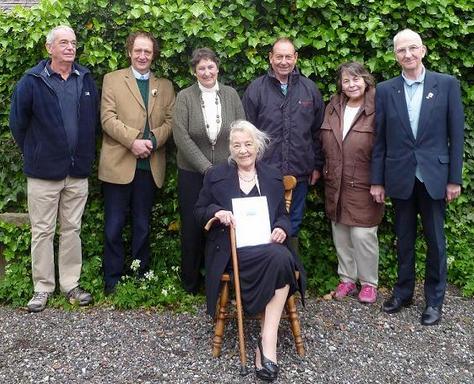News of the award-winning work of Brenda Sutcliffe of Sheep Bank Farm, Littleborough in Lancashire was featured on an Indian website and continues to be widely read in that country.
She has written at length about the damage done to farmers by toxic organophosphate sheep dips. It has now been lodged as a reference document with the British Library. Campaigner Peter Evans (far right) has now placed Part 4 online and it can be sent as an email attachment.  Brenda’s friend and fellow-campaigner, Margaret Percival, hosted the award presentation by Tom Rigby (2nd left) at Leylands Farm on the Wigan/Salford border.
Brenda’s friend and fellow-campaigner, Margaret Percival, hosted the award presentation by Tom Rigby (2nd left) at Leylands Farm on the Wigan/Salford border.
In 1976 the British government imposed a legal requirement on sheep farmers to dip their flocks with this pesticide as a precaution against sheep scab and that regulation was not lifted until 1992.
Organophosphates (OPs) are synthetic chemical compounds used in thousands of licensed pesticides. Brenda’s whole family has been affected by OP sheep dip and for years she has campaigned tirelessly, on behalf of many others affected, despite seriously impaired health. An article with a good account from 1992-2004 is Are our shepherds being poisoned?
General information was given in the House of Lords [2009] by another victim, the Countess of Mar, and Lord Greaves, who was taken to meet Brenda at her farm on the Saddleworth Moors – the white building faintly circled on the picture above.
The potential dangers and precautions needed were not unknown; in the 1940s it was becoming apparent that workers were suffering serious adverse health effects from OP pesticides. An inquiry was instigated and in 1951 Lord Zuckerman, a senior government advisor, issued a report in which the deadly nature of the poisons was recognised. He warned that hospitals should be notified before any OP insecticides were used in the locality and that the words “DEADLY POISON” should be printed on all product labels and cans containing them. There is no evidence that his recommendations were implemented and claims were made that the more modern pesticides were much safer.
In 1980: the HSE guidance sheet, known as MS17, was produced but never circulated to farmers, doctors, vets, or the Ministry of Defence & during the next ten years hundreds of farm workers began to report symptoms including fatigue, memory loss, weakness, joint and muscle pain and depression, which they put down to low-level exposure to organophosphates over long periods of time.
Sceptics are referred to the mainstream medical finding:
The Lancet : Volume 354, Number 9173, 10 July 1999
10 Jul 1999 … Prolonged, low-dose exposure to organophosphorus sheep dips is linked with chronic ill-health—the most risky occupational activity seems to be handling of concentrated pesticide. These are the main findings of a report, Risks accumulate with cumulative sheep-dip exposure, by Kelly Morris, published by the Institute of Occupational Medicine (IOM; Edinburgh).
Due to the efforts of affected people like Brenda the use of OPs is no longer compulsory, but it is still allowed to pose a danger to pilots and passengers on long-haul flights and as an ingredient in other products.
We salute all such ‘whistleblowers’, recognising that the health of Indian farmers and farm workers has also been seriously damaged by such products.

Recent Comments